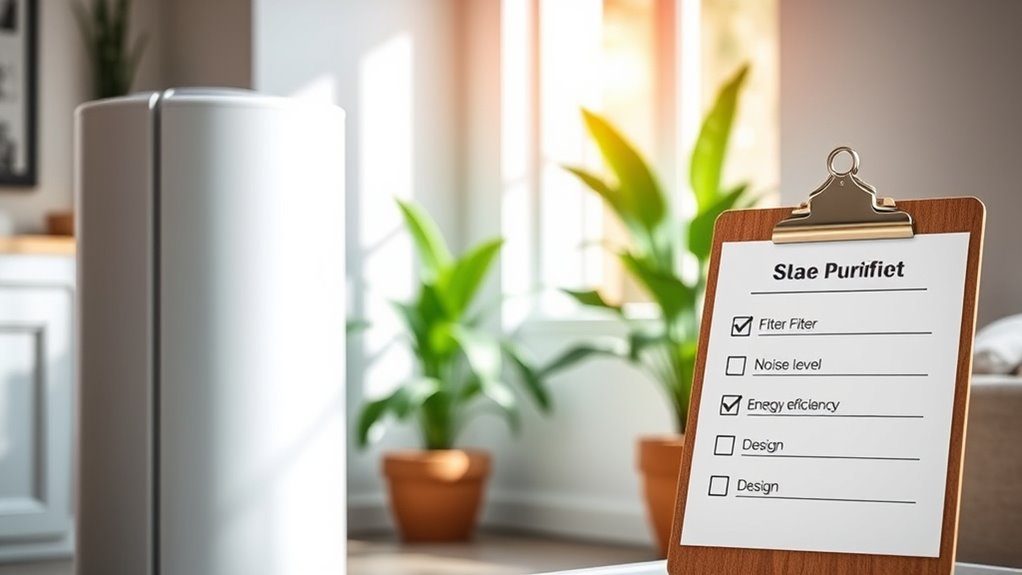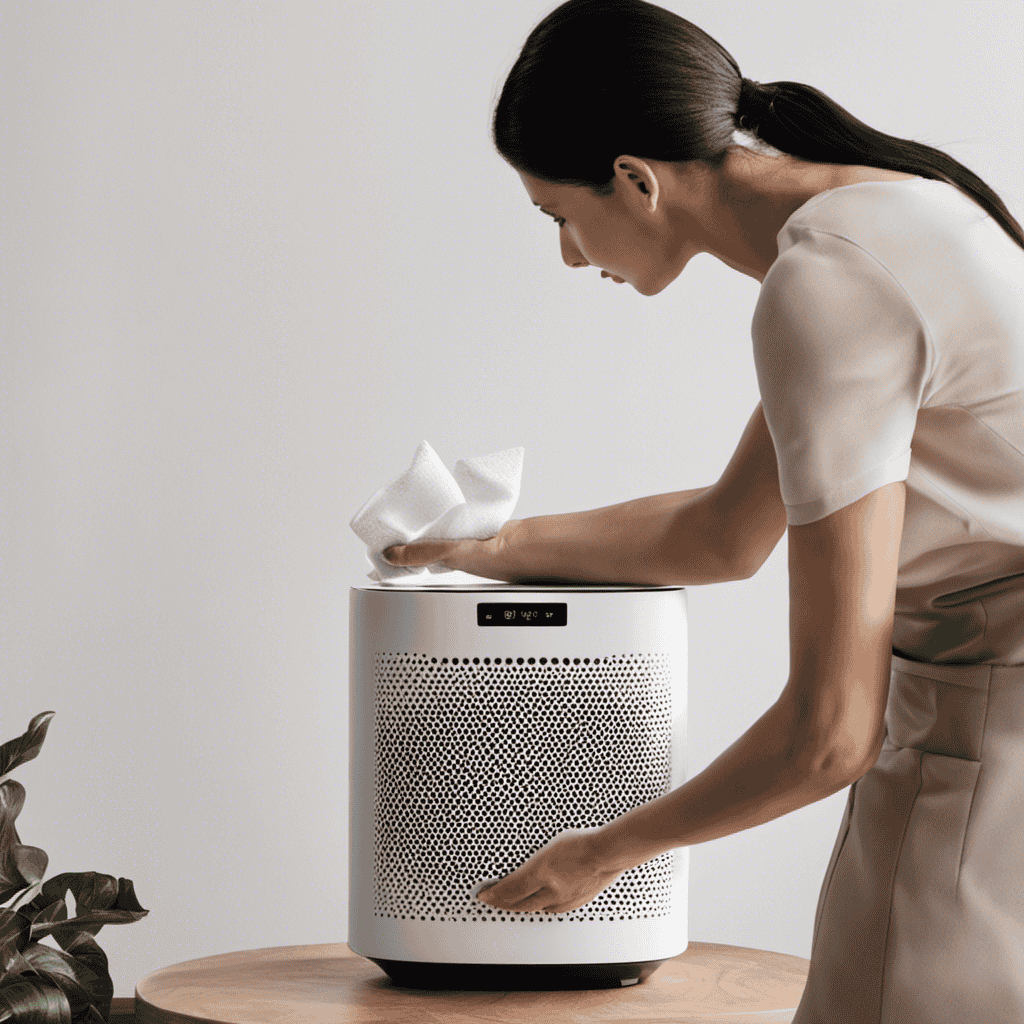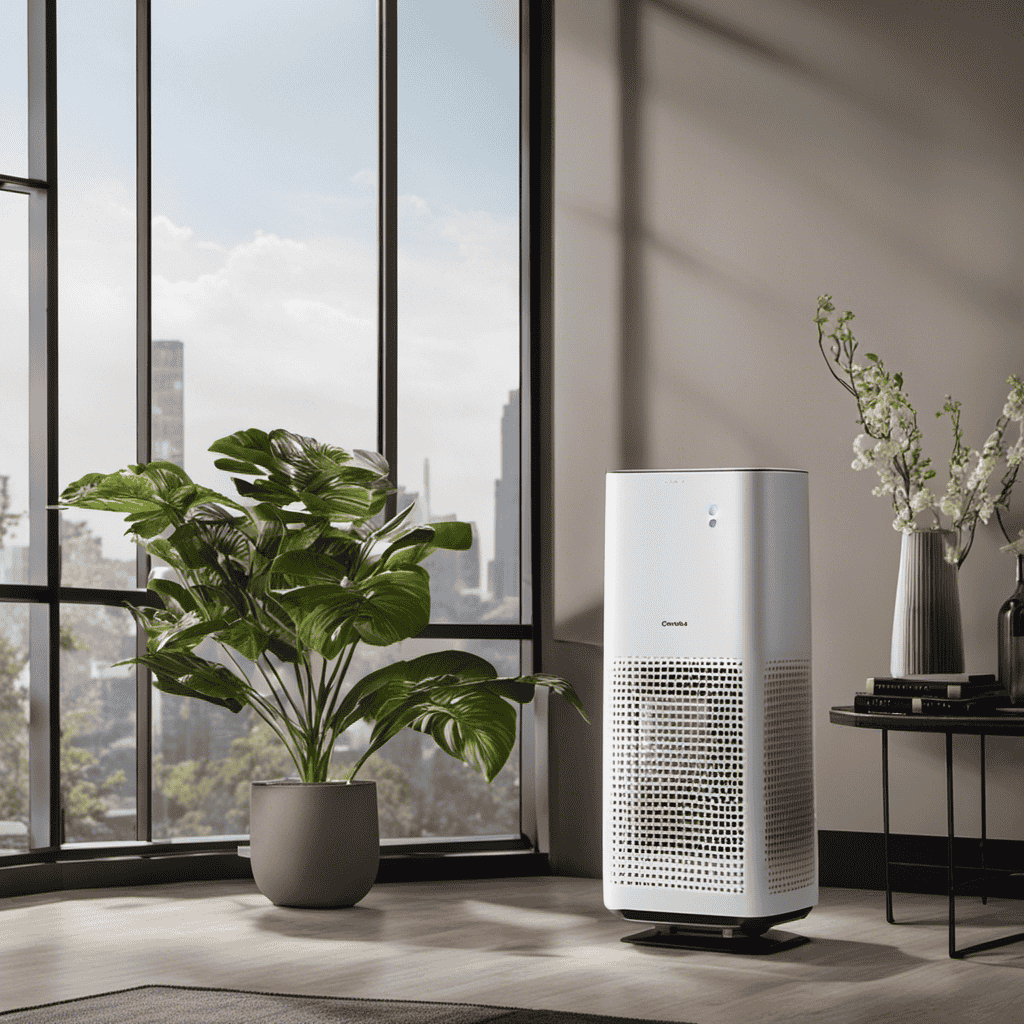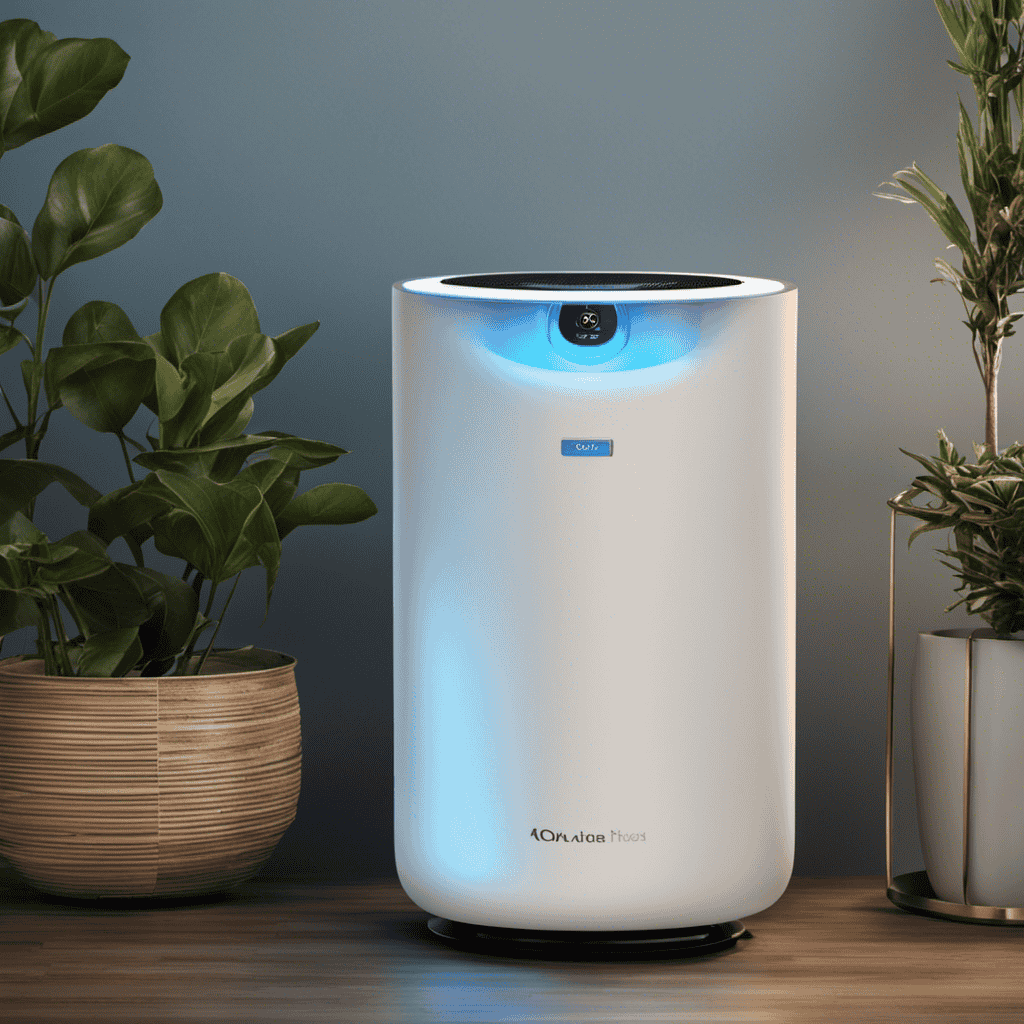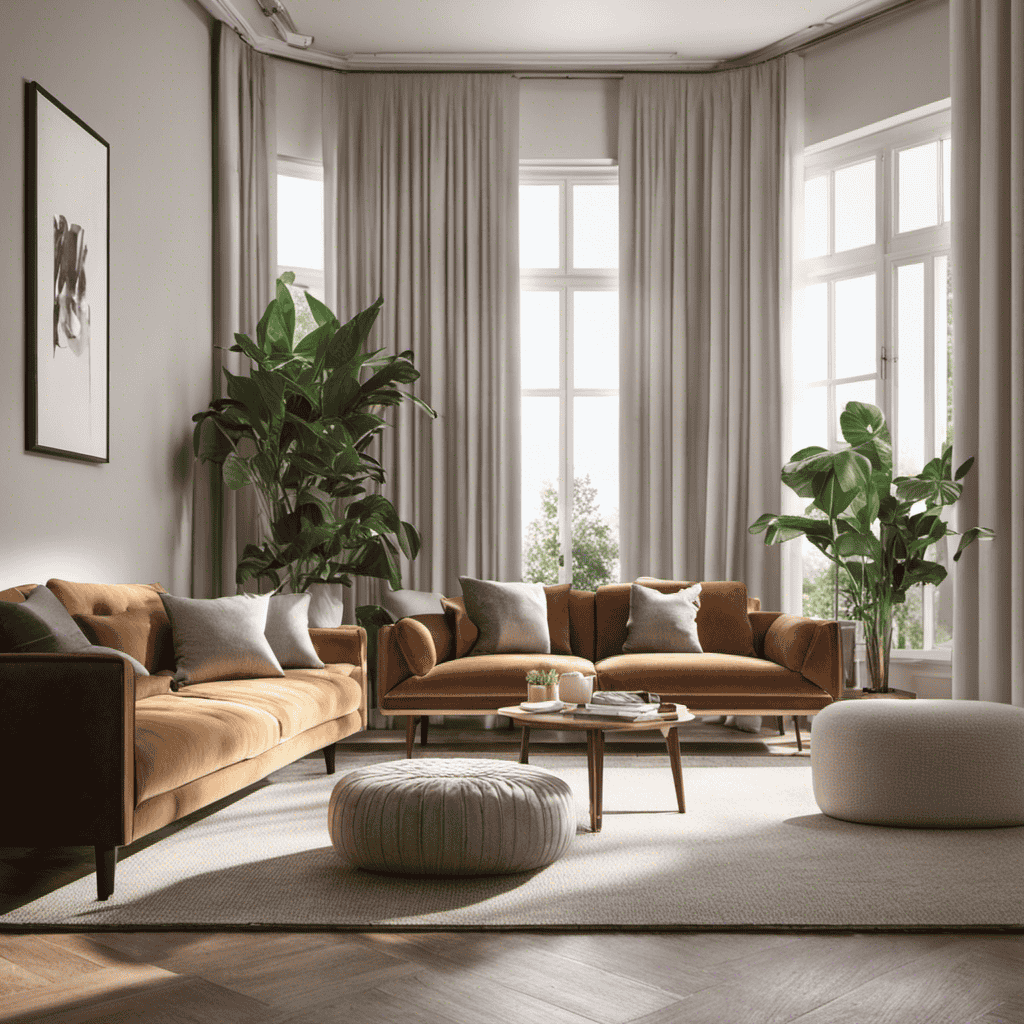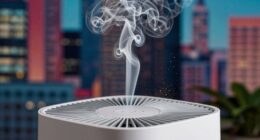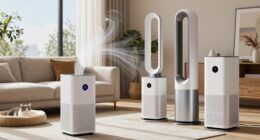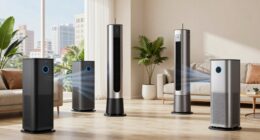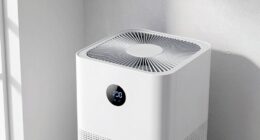To choose a quiet air purifier, focus on models with adjustable fan speeds and sound-dampening features that reduce noise during operation. Opt for energy-efficient units with certifications like Energy Star, which often run more smoothly and quietly. Regularly maintain and replace filters to prevent strain and extra noise. Pay attention to size and placement, ensuring the unit sits on stable surfaces and isn’t blocked. If you want to discover more tips, keep exploring for detailed guidance.
Key Takeaways
- Choose models with adjustable fan speeds and sleep modes for customizable noise control.
- Look for Energy Star-certified purifiers to ensure energy-efficient, quieter operation.
- Select units with HEPA filters and maintain them regularly to prevent noise from strain or clogged filters.
- Place the purifier on stable surfaces and avoid enclosed spaces to minimize vibrations and airflow noise.
- Review user feedback and product specs for low noise ratings and features that promote quiet performance.

When selecting a quiet purifier, understanding what features contribute to low noise levels is essential. Noise levels are a primary concern because they directly impact your comfort and the overall atmosphere of your space. A purifier that operates quietly won’t disrupt your sleep, work, or relaxation time. To achieve this, look for models with adjustable fan speeds, especially those with a sleep or quiet mode. These settings reduce noise by lowering fan speed, making the purifier less intrusive. Additionally, some purifiers are designed with noise-dampening features, such as insulated motors or sound-absorbing materials that minimize operational hum. Incorporating sound vibration science into the design can further enhance noise reduction, making your environment more peaceful.
Choose quiet purifiers with adjustable fan speeds and noise-dampening features for a peaceful environment.
Energy efficiency plays a significant role in choosing a quiet purifier. Not only does a more energy-efficient model save you money on electricity bills, but it also tends to operate more smoothly and quietly. When examining energy efficiency, check for units with an Energy Star certification. These purifiers are tested to ensure they consume less power without sacrificing performance. An efficient purifier often uses advanced motor technology or optimized airflow systems, which contribute to quieter operation by reducing mechanical vibrations and airflow noise. Plus, energy-efficient models tend to have longer-lasting components, reducing maintenance noise and inconvenience over time.
Another key factor is the filter type and maintenance needs. HEPA filters, for example, are highly effective at capturing airborne pollutants and generally require less frequent replacement. When filters are clean and properly maintained, the purifier runs more efficiently, which often translates to quieter operation. Conversely, clogged filters can strain the motor, increasing noise levels and decreasing energy efficiency. Regularly replacing or cleaning filters ensures smooth operation, keeping noise levels low and maintaining energy efficiency.
The size and placement of the purifier also influence noise levels. Smaller units tend to operate more quietly, especially if they are designed specifically for personal spaces or bedrooms. Proper placement is equally important; placing the purifier on a stable, level surface and away from walls or furniture can prevent vibrations that amplify noise. Avoid placing the device in enclosed or tight spaces where airflow is restricted, as this can cause the motor to work harder and produce more noise.
Finally, consider user reviews and product specifications carefully. Real-world experiences often reveal how noisy a purifier truly is during prolonged use. Look for models praised for quiet operation and energy-efficient design. By paying close attention to these details, you’ll be able to select a purifier that maintains a peaceful environment without running up your energy costs or creating unnecessary noise distractions.
Frequently Asked Questions
How Do Noise Levels Vary Between Different Purifier Models?
You’ll notice noise levels vary considerably between purifier models. For a clear noise comparison, check their decibel levels—lower decibels mean quieter operation. Some models operate as low as 20-30 dB, almost silent, perfect for bedrooms, while others can reach 50-60 dB, which might be louder than desired. Always compare decibel ratings to find a purifier that meets your noise preferences and fits your space comfortably.
Are Quieter Purifiers Less Effective at Air Purification?
You might wonder if quieter purifiers are less effective, but that’s not always true. Many models offer excellent air purification while prioritizing noise reduction, enhancing user comfort. Quiet purifiers use advanced technology to maintain high filtration efficiency without disrupting your environment. So, don’t assume lower noise levels mean compromised performance; you can enjoy both effective air cleaning and a peaceful space.
What Is the Average Lifespan of a Quiet Air Purifier?
You’ll find that quiet air purifiers typically last around 3 to 5 years, depending on their build quality and usage. Noise level comparisons show that models designed for low noise often have durable components, ensuring purifier durability over time. Regular maintenance can extend their lifespan, making them a reliable choice for ongoing air quality improvement. Keep an eye on manufacturer guidelines to maximize your purifier’s longevity.
Can a Quiet Purifier Handle Large Room Sizes Efficiently?
A quiet purifier can handle large room sizes efficiently if it has a high purification capacity suitable for your space. Check the CADR (Clean Air Delivery Rate) and room size recommendations to guarantee it matches your needs. While many quiet models excel in low noise levels, verify their capacity to cover your room size to maintain effective air quality without noise disruptions.
Do Quiet Purifiers Require More Maintenance Than Louder Models?
Your curiosity is sharper than a hawk! Quiet purifiers don’t necessarily require more maintenance than louder models. In fact, their maintenance frequency and filter replacement needs are usually comparable. Since quieter units often have smaller or similar filters, you’ll find that keeping up with regular filter replacements keeps your air fresh without extra effort. So, rest assured, choosing a quiet purifier won’t turn your routine into an ongoing headache.
Conclusion
Follow this 5-point checklist, and you’ll be wielding the ultimate power to select a purifier so quiet, it’ll make a whisper sound like a shout. With these tips, you’ll transform your space into a serene sanctuary where noise is banished to the domain of myth. Prepare to experience tranquility so profound, it’ll seem like you’ve discovered the secret to eternal silence itself. Get ready to elevate your environment to a zen-like state of bliss—quiet has never been this majestic.
